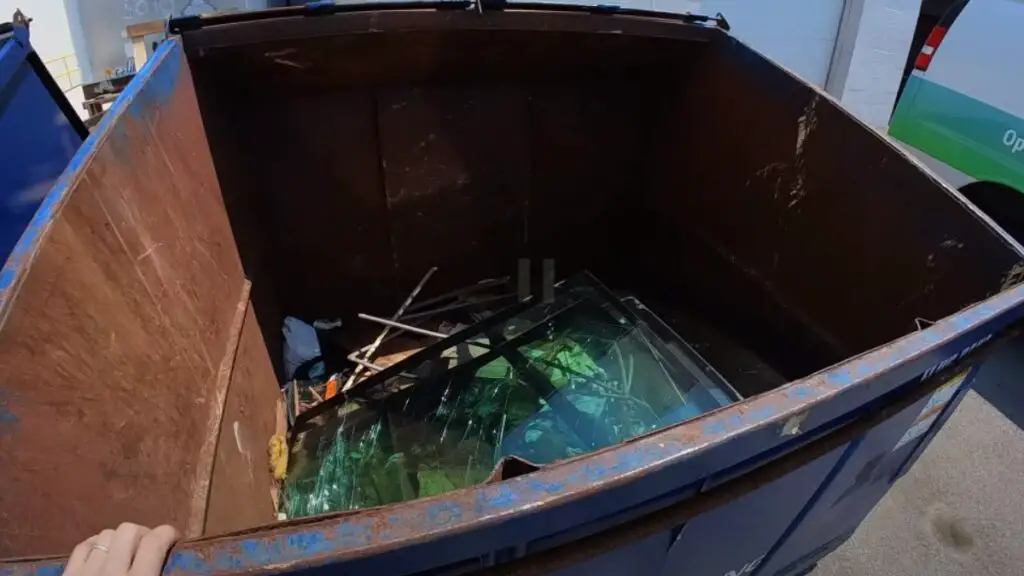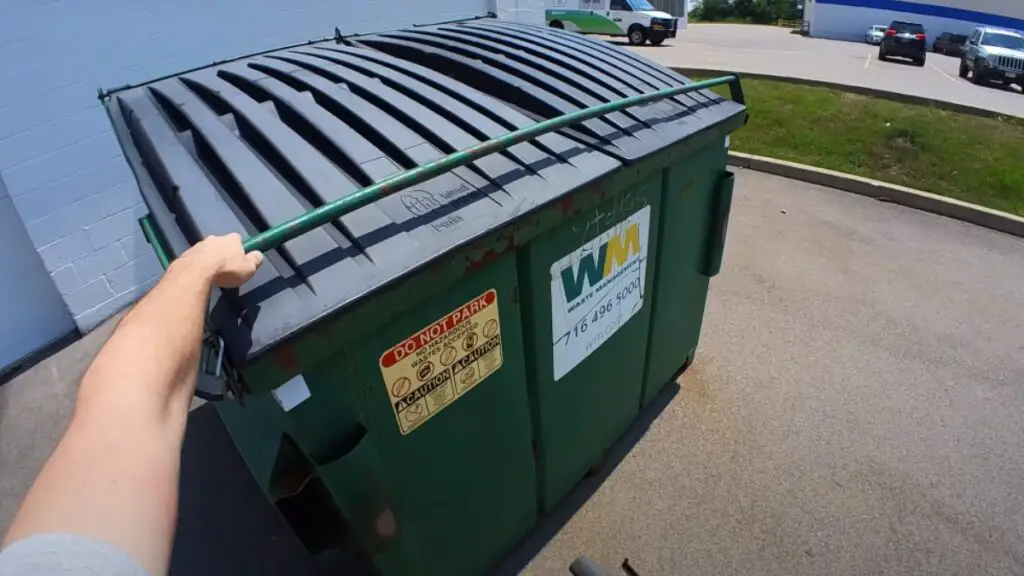Dumpster diving at Harbor Freight has become an unexpectedly popular activity over time.
This practice, often perceived as an unconventional treasure hunt, uncovers useful tools and equipment that have been thrown away. Although it requires a keen eye and a bit of luck.
So, in this article, we will explore the legality and the earning potential of dumpster diving at Harbor Freight.
Dumpster Diving at Harbor Freight

Harbor Freight is a renowned discount tool and equipment retailer, offering high-quality products at remarkably low prices.
Since its inception in 1977, the company has expanded from a small family-owned business to a national chain with over 1,000 stores across the United States.
It’s known for its wide range of products; Harbor Freight appeals to professional tradespeople and casual DIY enthusiasts.
According to data from the National Recycling Coalition, 75% of America’s waste is recyclable, yet only around 30% is actually recycled.
This implies that there’s a significant amount of potentially useful material being thrown away.
Specifically, Harbor Freight, a major retail outlet for tools and equipment, often discards returned items or slightly damaged goods that still hold substantial utility.
An estimated 10% to 20% of these discarded items can be salvaged, according to a survey by The Scrappers Guide.
Is It Illegal to Dumpster Dive at Harbor Freight?
While the legality of dumpster diving can vary based on local ordinances and regulations, it’s worth noting that Harbor Freight has policies in place regarding waste disposal and property access.
The company’s dumpsters are typically located on private property, and unauthorized access could potentially be deemed as trespassing.
However, laws regarding dumpster diving might differ from city to city or even state by state.
Which makes it crucial for individuals to familiarize themselves with local regulations before engaging in such activities.
It’s also noteworthy that according to a 1988 Supreme Court Case, California v. Greenwood when a person throws something out, that item is considered public domain.
However, if the trash is located on private property, laws against trespassing can supersede this ruling.
Is It Legal to Dumpster Dive at Night at Harbor Freight?
While there is no federal law against dumpster diving in the United States, certain states, cities, or municipalities may have their own rules and regulations.
For example, in California, dumpster diving is considered legal unless it’s prohibited by local regulations.
However, when it comes to private properties like Harbor Freight, the situation can be a bit more complex.
If a dumpster is within the property boundaries, it could be considered private, meaning diving could lead to trespassing charges.
Moreover, Harbor Freight, like many other companies, has policies in place to discourage dumpster diving due to potential dangers and liabilities.
In 2016, a report published by Property Casualty 360 estimated that businesses paid out an average of $20,000 for premises liability claims, a category that could include accidents resulting from dumpster diving.
To ensure safety and respect for private properties, it’s always advisable to ask for permission and avoid diving at night due to potential hazards.
What Is The Best Time to Dumpster Dive at Harbor Freight?
The ideal time to dumpster dive at Harbor Freight or any other retail establishment usually hinges on their delivery and trash pickup schedules.
Typically, most stores get new shipments early in the week, meaning that old or damaged stock often gets discarded shortly after.
Consequently, a good time to check dumpsters might be in the late evening or early morning hours of Tuesday or Wednesday.
After employees have had a chance to sort through the new deliveries but before the trash collection services arrive.
However, schedules will vary depending on the specific store location, so it can be beneficial to discreetly observe the trash collection routine for a week or two to ascertain the best possible timing.
What to Look While Dumpster Diving at Harbor Freight?
When dumpster diving at Harbor Freight, keep your eyes peeled for a variety of items that could be of value.
Start by looking for tools; Harbor Freight is, after all, a tool and equipment company.
Studies show that nearly 30% of items thrown away are tools that are either slightly damaged or returned by customers.
However, be on the lookout for equipment parts. These parts can often be repurposed or sold.
In fact, a recent report found that up to 15% of items found in dumpsters at similar stores were valuable equipment parts.
So here is the list of things to look at while diving:
- Seasonal Items
- Clearance Items
- Open Boxes
- Returned Items
- Overstock
Does Harbor Freight Throw Away Returns?
Contrary to popular belief, Harbor Freight does not simply discard returned items. In fact, the company has an established protocol for handling such merchandise.
First, the returned items are inspected thoroughly for any damage or discrepancies. If the product is in a sellable condition, it typically goes back on the shelf.
If there are minor issues but the item is essentially functional, it may be marked down and sold as an “open box” deal.
However, items that are significantly damaged or non-functional are indeed disposed of.
According to the company’s 2019 Sustainability Report, Harbor Freight recycled over 1,500 tons of metal, 400 tons of cardboard, and 150 tons of plastic that year.
It’s a practice that not only maintains customer trust but also contributes to the company’s environmental sustainability efforts.
How Much Money Can You Make From Dumpster Diving at Harbor Freight?
The exact amount significantly depends on various factors such as location, competition, and the specific store’s waste management policies.
In terms of figures, it’s challenging to provide an exact amount due to the unpredictable nature of the activity.
However, some reports suggest that individuals well-versed in this practice can take anywhere from a few hundred to over a thousand dollars per month by reselling their finds.
For instance, tools and equipment that were returned or slightly damaged but still functional can be sold at a fraction of their original price, still resulting in substantial gains.
However, some successful divers report finding tools and equipment that are slightly used or have minor cosmetic flaws but otherwise fully functional.
However, the potential monetary value of such findings can vary significantly.
On a good day, one might find items worth between $50 to $100 in resale value, although this is not a guarantee and depends a lot on luck, timing, and location.
Safety Precautions For Dumpster Diving At Harbor Freight
Dumpster diving at Harbor Freight or any similar establishment requires a set of safety precautions, particularly due to the potential risks involved.
For starters, it is crucial to wear the appropriate gear, including gloves, to protect your hands from sharp objects and hazardous substances.
Investing in a sturdy pair of boots can also help maintain footing and protect against the risk of stepping on dangerous items.
Always bring a flashlight for visibility, especially when diving at night.
Further, it’s advisable to use a reaching tool to sift through materials without having to climb into the dumpster physically.
You should also avoid diving in compactors since they possess inherent risks, including the possibility of being crushed.
If you come across hazardous materials such as pesticides or batteries, do not attempt to remove them.
According to the Environmental Protection Agency (EPA), improperly disposed hazardous waste poses significant risks to public health and the environment.
Lastly, always sanitize anything you find and decide to keep. The CDC recommends using a household disinfectant or a simple bleach solution to sanitize surfaces.
So, if you are planning to dumpster diving at Sephora, Lululemon, Lowes, or Dicks Sporting Goods; first you should check the state laws before going to your hunt.

Frederick Perez is the founder of Scrape Dude. He loves exploring and finding hidden treasures in unexpected places. Frederick has been dumpster diving and gold panning for years, turning his hobby into our website to share his adventures. He’s known for his friendly advice and exciting stories, inspiring others to discover the joy in these unique hobbies. His expertise makes Scrape Dude a trusted and fun place to learn and explore.


